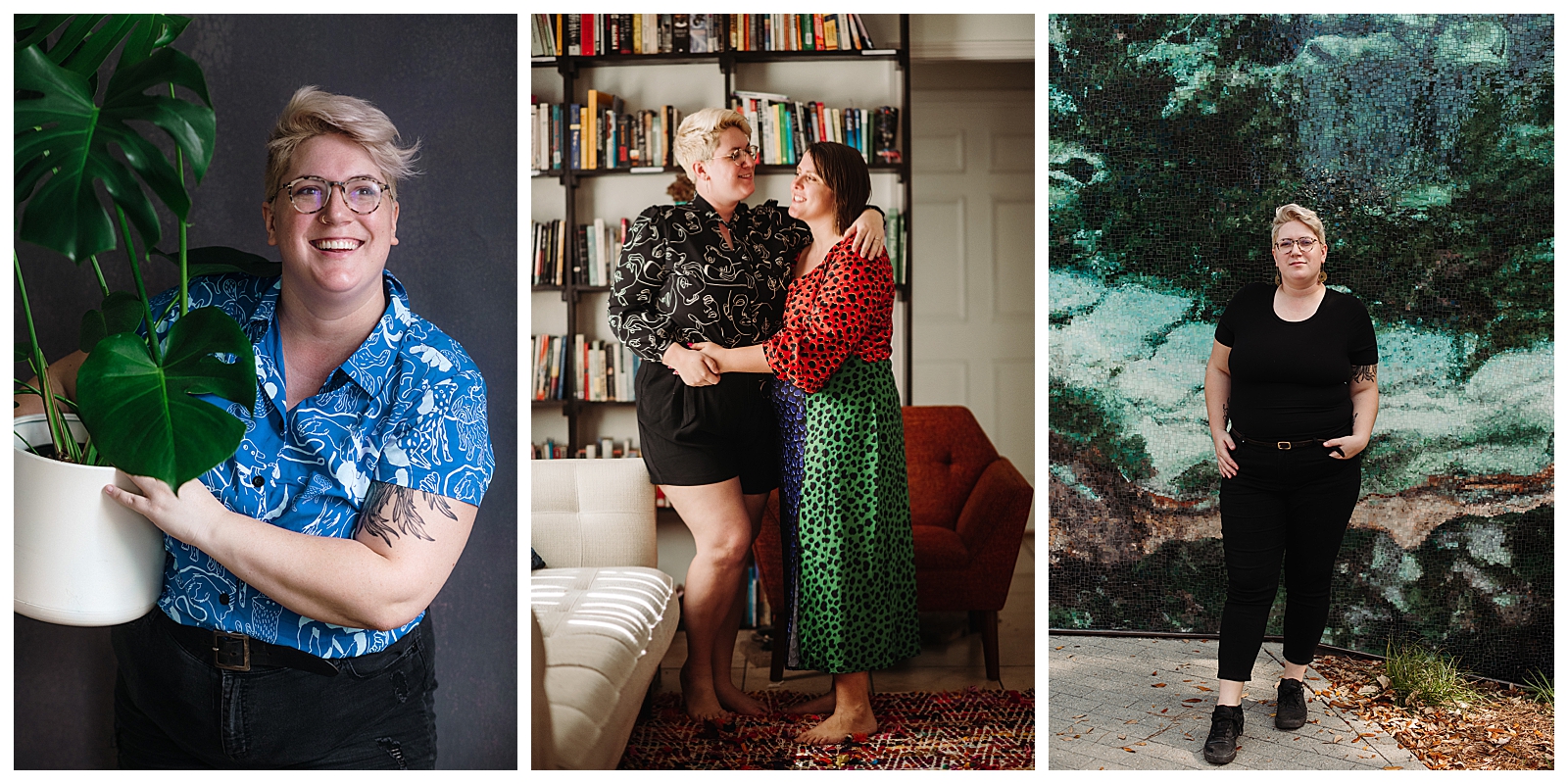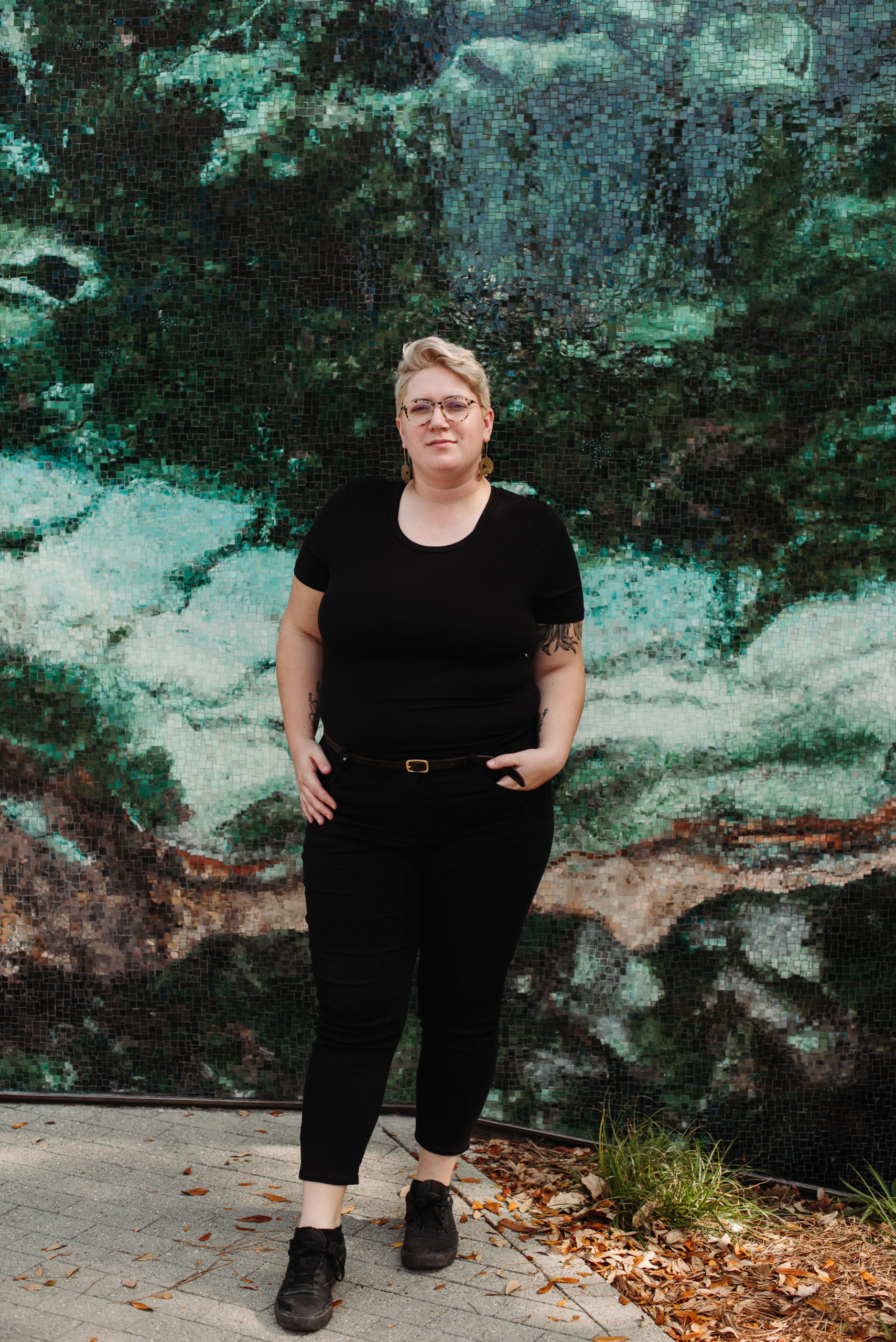For Photographers
Small Weddings
Planning TIPS
couples sessions
Weddings
LGBTQ
Here, I celebrate and affirm your love no matter what your love looks like. I know the wedding industry was built on a foundation of whiteness, thinness, and cisheteronormativity.I stand to change that. Join me.
Your queer wedding photographer & posing coach.
I'm Theo
As a Queer wedding photographer I notice subtle hints of homophobia everywhere in the wedding industry. This past week, I have seen two not-so-subtle cases to the flavor of “We don’t work with LGBTQ couples because of our religion” gained a lot of attention. Both posts that have been widely shared across Facebook groups are screenshots that follow this narrative:
- A couple reaches out to a wedding vendor.
- The wedding vendor responds with (paraphrasing) “Hi! Thank you for inquiring! Are y’all queer? I don’t work with LGBT couples (although I totally respect you and your choice!). Homosexuality is just against my religious belief. Happy wedding planning.”
It is always disappointing but never surprising when I see these posts. The thing that is surprising to me is that so many other business owners come to the bigoted business owners’ defense. I see “Well people have the right to refuse service.” or “They aren’t being rude. They are just sharing their beliefs.”
This casual acceptance of homophobia is not ok.
I could write a whole piece about how the word “homosexual” wasn’t in the bible until 1946. I could write a whole piece about how Jesus would have loved an accepted queer people because they are created in God’s image. But, I am not Christian and wasn’t raised Christian (although I do hold tons of cultural Christian privilege), and there is already lots to read on these topics that you can find from Google.
What I can tell you is that turning away LGBTQ couples is homophobia. It may also be your religious belief, and your religious belief is homophobic.
Here are some direct actions I think we can take as a wedding industry, as couples getting married, and a society. (I am going to be using and not defining LGBTQ terms here. If you are unfamiliar, I included a glossary at the end.)
To any cishet couple that is getting married
1. If you are cishet or cishet passing, are you asking all of your vendors their stance on working with queer couples?
When I surveyed queer couples, they said that their biggest discomfort at weddings has been when they were the only queer person in a wedding party or as a guest. If you have queer people in your inner circle (you probably do even if you don’t know it yet) and you want them to feel welcomed at your wedding, start asking all of your vendors now.
2. Are you open to making your wedding gender neutral?
I know people love traditions, and please know I want you to have a wedding you love. There are a few small things you can do to make your cishet wedding more LGBTQ-inclusive. You can check out a blog I wrote on this here (How to make your wedding gender-neutral).
To any photographer who wants to refuse services to LGBTQ couples
1. Could you list on your website that you do not work with LGBTQ couples so that queer people can stop spending energy researching your business?
By not openly listing your business restraints, you are forcing LGBTQ couples into doing the emotional labor of reaching out to you and being discriminated against. As a wedding vendor, don’t you want couples to have a nice experience planning their wedding? Just be clear, if homosexuality is against your religion include that next to the Bible verse on your footer.
2. Does listing “We do not work with LGBTQ couples” on your website make you uncomfortable?
Why? Please sit in that feeling and unpack why you won’t publicly list that alongside your other religious values on your website.
3. Are you starting to see that your religious belief is actually homophobic and you would like to change?
Great, I have educational resources for you. I am a queer non-binary person married to a Christian woman, and I can be a person to talk to. My approach is non-judgmental and shame-free. If you truly want to change, I am here for that.
To vendors who want to be an ally
1. Being an LGBTQIA ally is intersectional work.
If you want to be an ally, you also need to believe that Black lives matter and be doing actively anti-racist anti-oppression work. All of this work is intersectional, and you need to be doing all of it.
2. Hold industry educators accountable.
If you have ever paid money to get a template, a workbook, a posing course, a marketing course, and it is full of “Bride and Groom” language, ask the educator why. In the United States, same-sex weddings have been legal for 5 years. There is no excuse for profiting off perpetuating a false reality that all weddings are heterosexual.
3. Examine your referral list and second photographer list.
Does everyone on your list openly support and work with queer couples? Send them an email to ask if you are not sure. That email could look like this
“Hey! It’s 2020, and I am spending this week examining ways I could be a better ally for the LGBTQ community. I love referring to you/working with you as a second photographer. I took a look at your work, and I didn’t see any/only saw one styled shoot couple that was LGBTQ. What are your thoughts on queer weddings?”
4. Audit your website.
Look for Bride and Groom language, look at the picture you feature. If you need help with this I have a whole workbook and course for this.
5. Are you comfortable with they/them pronouns? Can you confidently explain what every letter in LGBTQIA+ stands for?
If not, please practice on your own time and get comfortable.
To my LGBTQ vendors
1. Hey, I love you.
2. Are you out and open about being an LGBTQ wedding vendor?
I am super lucky that lots of wedding vendors reach out to me and feel comfortable sharing their stories with me. I have had over a dozen queer vendors who are “not out” talk to me about it. You have to come out on your own time, and when you are ready, we are here for you.
For me, homophobia is life or death, and the more out people there are, the more normal being queer gets for all of us.
- Let’s normalize being Bi/Queer and in a hetero marriage/relationships
- Let’s normalize being gender non-binary
- Let’s normalize being queer
- Let’s normalize being trans
The more out we are, the more normalized we become.
3. Check your referral and second photographers list just like the cishet photographer (number 2 on the “Vendors who want to be an ally”) part
Thank you for reading this.
When my wife and I got engaged, our marriage would have been illegal. Sometimes I think about how we will tell our child (baby is still the womb and due October 2020) this story. I think about how the world is changing and becoming more accepting, and then I still see wedding vendors openly discriminating and using religion to cloak their homophobia. This system of oppression does not get changed unless we change it.
Are you ready to stand up?
P.S. I am doing a second round of “How to book your first LGBTQIA+ wedding” my free webinar Friday, July 31st. If you are ready to be an active ally to the LGBTQIA+ world, this webinar is for you. Sign up for the webinar HERE
————
Short Glossary
Cisgender – When someone’s gender identity matches the one they were assigned at birth based on their biological sex. “If you were born a female and assigned woman, and you identify as a woman, then you are cisgender.”
Cishet – A shorthand used to combine “cisgender” and “heterosexual” used to describe a person that is both.
Heterosexual – A person, relationship, romantic attraction or sexual attraction to men for women and women for men.
Trans – A shorthand for transgender, meaning someone who does not identify with the gender that matches the biological sex they were assigned at birth.
Gender Non-Conforming (GNC) – An individual who does not match the gender expression that matches the biological sex assigned at birth.
Non-Binary (NB or sometimes enby) – A person who does not exclusively identify as man or woman. They can identify as both, neither, or something else.
For more terms and definitions visit – HRC Glossary of Terms

Tia Nash (they/she/he) is a queer and nonbinary wedding photographer and industry educator based in New Orleans Louisiana. They feel most inspired when working to make the wedding industry a more inclusive space. When not working at weddings they are fussing with their house plants trying to grow a fiddle leaf fig forest.
Learn more about Tia here

